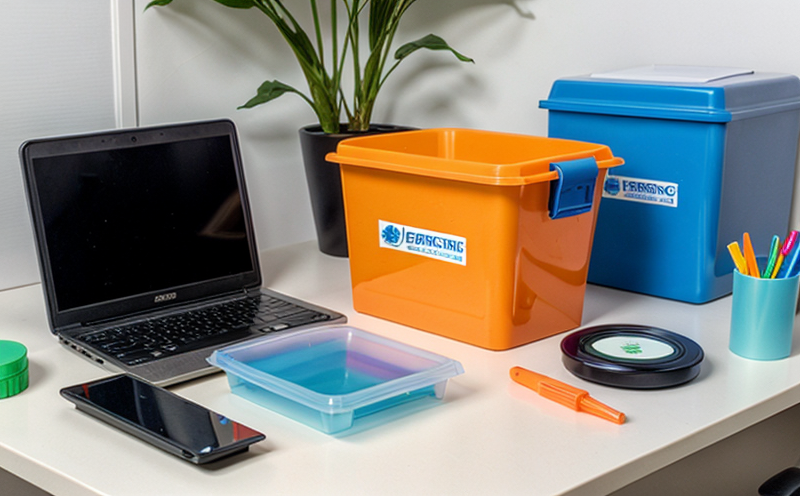ANSI BIFMA X5.1 Durability Testing of Plastic Office Chairs
The ANSI/BIFMA X5.1 standard is a benchmark in the office furniture industry, ensuring that office chairs meet durability and performance expectations. This testing protocol specifically evaluates plastic components used in office chairs to ensure they can withstand prolonged use without compromising safety or functionality.
During this test, samples are subjected to accelerated aging conditions designed to simulate real-world usage scenarios. The purpose is to determine how well the materials perform under repeated stress, such as weight distribution and movement over time. Compliance with ANSI/BIFMA X5.1 is crucial for manufacturers to ensure their products meet industry standards and consumer expectations.
The testing process involves several key steps. Initially, chairs are prepared by cleaning them according to manufacturer specifications. Specimens are then placed on a vibration test machine where they undergo a series of mechanical stress tests over an extended period. This includes applying loads that simulate the weight distribution expected during regular use. Additionally, environmental factors such as temperature and humidity are controlled to accelerate aging processes.
After undergoing these rigorous conditions, chairs are visually inspected for any signs of damage or deformation. Material properties like flexibility, strength, and color retention are also evaluated using specialized equipment. Data collected from these tests is analyzed and compared against the ANSI/BIFMA X5.1 criteria. Compliance with all specified parameters ensures that the product meets durability requirements as defined by this standard.
Understanding the importance of this test extends beyond just meeting regulatory requirements; it plays a critical role in maintaining brand reputation and customer satisfaction. By adhering to these stringent guidelines, manufacturers can provide customers with high-quality products that offer long-term value. Moreover, compliance helps businesses stay competitive within an increasingly demanding market where reliability is key.
The ANSI/BIFMA X5.1 standard not only sets minimum performance levels but also promotes innovation by encouraging continuous improvement in material science and engineering practices. As technology advances, so too does our understanding of how materials behave under various conditions. This ongoing evolution ensures that products continue to meet or exceed expectations for durability and safety.
In summary, ANSI/BIFMA X5.1 durability testing is an essential component of the quality control process in manufacturing plastic office chairs. It provides a structured approach to evaluating material performance and helps ensure consistency across production batches. By investing time and resources into this type of testing early on, manufacturers can build trust with consumers while reducing potential risks associated with product failure.
Why It Matters
The ANSI/BIFMA X5.1 standard is more than just a set of specifications; it represents the collective effort of industry leaders to establish consistent quality standards for office furniture, including plastic chairs. Compliance with this standard ensures that products are not only durable but also safe and user-friendly.
For manufacturers, adherence to ANSI/BIFMA X5.1 offers several advantages beyond meeting regulatory requirements. It provides a framework for continuous improvement by encouraging the exploration of new materials and manufacturing techniques. This commitment to innovation helps maintain competitive advantage in an ever-changing market where customer satisfaction is paramount.
From a consumer perspective, compliance with this standard translates into greater confidence when purchasing office furniture. Knowing that products meet rigorous testing protocols instills trust in brands and fosters long-term relationships based on reliability and quality.
In addition to benefiting manufacturers and consumers alike, ANSI/BIFMA X5.1 also contributes positively to the broader business environment by promoting fair competition among industry participants who all adhere to these same standards. This level playing field ensures that all companies are held equally accountable for delivering consistent performance across their entire product lines.
The standard’s focus on durability goes hand-in-hand with efforts towards sustainability and resource efficiency, which have become increasingly important considerations in today's global marketplace. By prioritizing longevity over disposable design trends, businesses can reduce waste while still offering attractive solutions at reasonable prices.
International Acceptance and Recognition
The ANSI/BIFMA X5.1 standard has gained widespread acceptance not only within the United States but also internationally, reflecting its significance in the global office furniture market. Many countries recognize this standard as a best practice for ensuring product quality and safety.
In Europe, the European Committee for Standardization (CEN) recognizes the ANSI/BIFMA X5.1 standard through equivalent standards such as EN 372-1:2018, which covers similar aspects of chair durability testing. Similarly, other regions like Asia-Pacific adopt these guidelines based on their own national standards and industry practices.
The international recognition of this standard underscores its relevance across borders and cultures, making it a valuable tool for businesses operating globally or seeking to expand into new markets. Companies that comply with ANSI/BIFMA X5.1 can leverage this reputation internationally without needing additional certifications specific to each country they serve.
Environmental and Sustainability Contributions
The ANSI/BIFMA X5.1 standard plays a crucial role in promoting environmental sustainability by encouraging the use of recycled materials and reducing waste throughout the product lifecycle. By focusing on durability, this standard helps minimize the need for frequent replacements, thereby extending the useful life of office furniture.
Manufacturers who adhere to ANSI/BIFMA X5.1 are more likely to incorporate sustainable practices into their operations. For instance, they may choose raw materials derived from recycled plastics or other eco-friendly sources. Additionally, these companies often prioritize energy-efficient manufacturing processes and waste reduction strategies, further contributing positively to the environment.
The emphasis on durability also supports circular economy principles by fostering a culture of reuse and repair rather than disposal after short-term use. This approach aligns with broader sustainability goals set forth by various international organizations, including the United Nations Environment Programme (UNEP).





